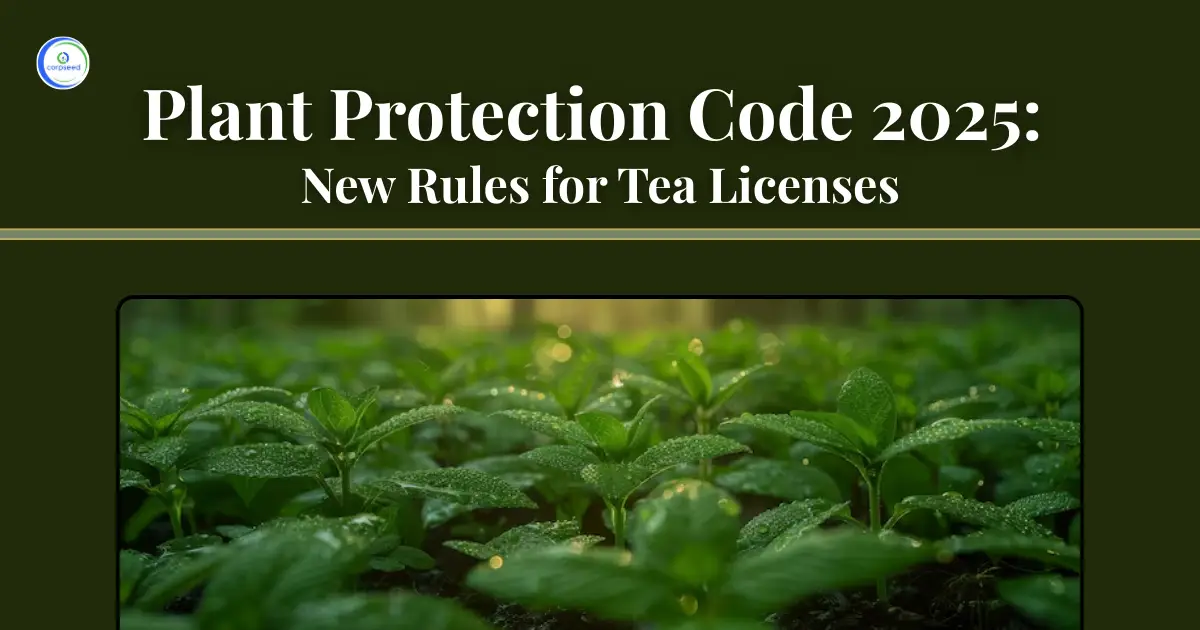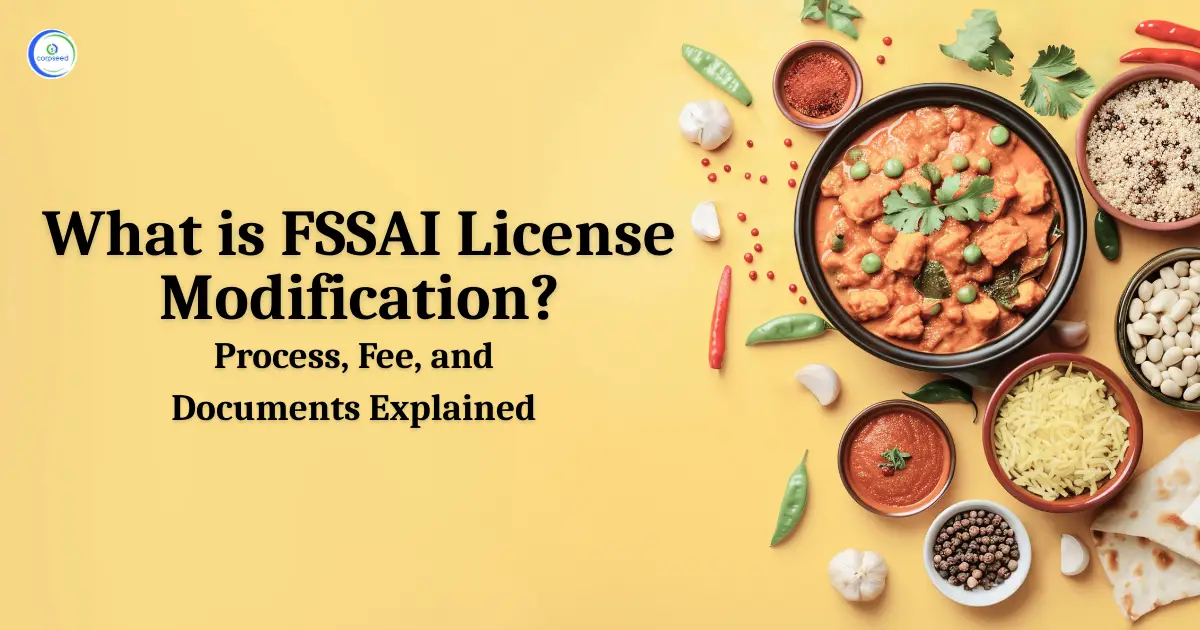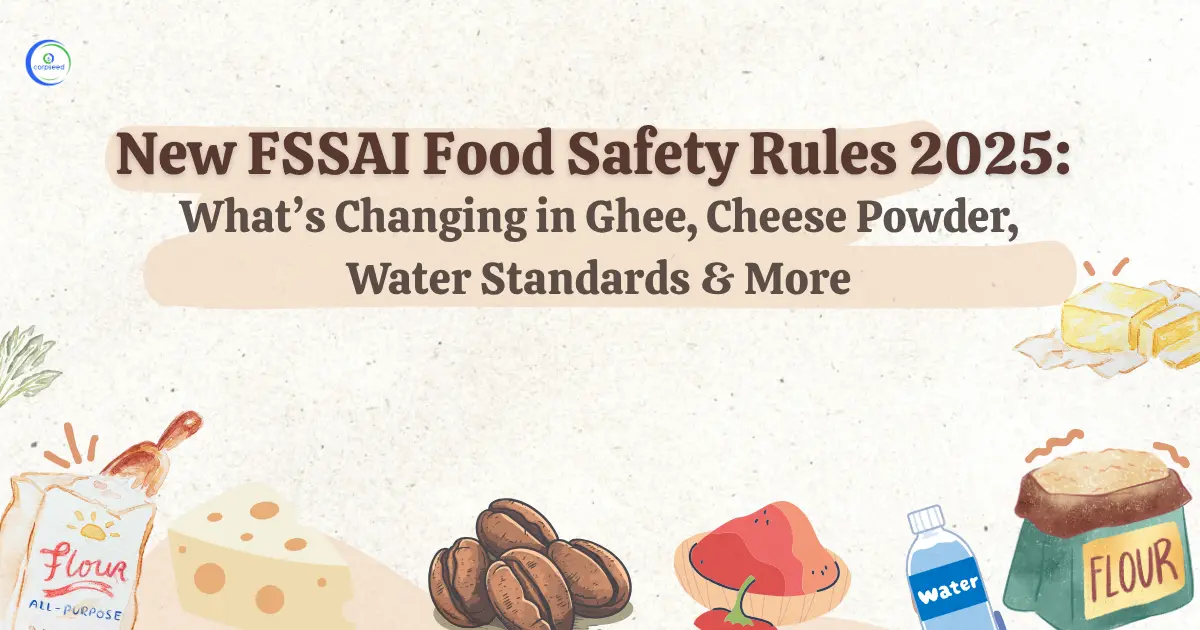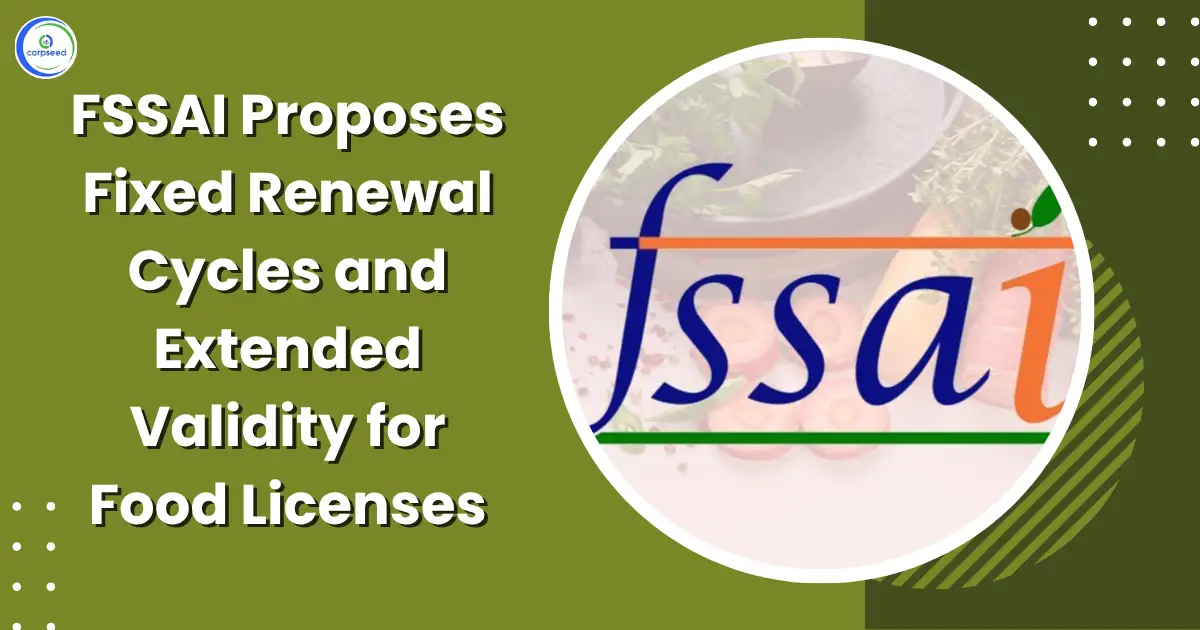The Ministry of Health and Family Welfare in India has issued new guidelines for the use of recycled Polyethylene Terephthalate (PET) as a food contact material (FCM), known as FCM-rPET. The new guidelines aim to regulate post-consumer recycling of PET, ensuring that recycled materials are safe for direct contact with food. These guidelines fall under the jurisdiction of the Food Safety and Standards Authority of India (FSSAI) and focus on the safety, testing and certification of FCM-RPET for food packaging applications.
Table of Contents
- What are the New Guidelines for Acceptance of Recycled Polyethylene Terephthalate (PET) as Food Contact Material (FCM-rPET)?
- Scope of the Guidelines
- Definitions for the Guidelines for Recycled PET as Food Contact Material
- Benefits of New FSSAI Guidelines
- Marking and Labelling of FCM-rPET
- Process Requirements for FCM-rPET
- Conditions for the Authorization of FCM-rPET
- Documentation for FCM-rPET Authorization
- Application Process for Authorization of FCM-rPET
- Conclusion
--------------Blog Contact Form-------------
What are the New Guidelines for Acceptance of Recycled Polyethylene Terephthalate (PET) as Food Contact Material (FCM-rPET)?
New guidelines issued by FSSAI specifically address the use of recycled PET in food packaging. The primary objective is to establish a clear process for ensuring the safety and quality of recycled PET when used as a food contact material. The process involves strict decontamination steps during the recycling process to remove any harmful contaminants from the post-consumer PET. These guidelines only apply to FSSAI-approved recycling technologies and exclude conventional recycling methods that do not meet dehydration standards. Recycled PET can now be used in food packaging materials only if it passes a number of tests and meets the required safety standards.
Scope of the Guidelines
The guidelines specifically apply to the recycling of post-consumer PET used for food packaging applications. They cover:
- Converting post-consumer PET into FCM-rPET resin, which is safe for food contact.
- Requirements for contamination processes in recycling technology.
- Test standards and acceptance criteria for FCM-RPET resins used in food packaging.
These guidelines do not extend to non-food grade applications or processes of recycled PET that fail to meet FSSAI’s dehydration standards.
Definitions for the Guidelines for Recycled PET as Food Contact Material
For the purpose of this guideline:
- Food Authority: means the Food Safety and Standards Authority of India (FSSAI) established under section 4 of the Food Safety and Standards Act, 2006.
- Manufacturer: means the operator of a recycling process and/or manufacturer of recycled Polyethylene terephthalate (PET) as Food Contact Materials as per the recycling technology approved by FSSAI.
- Virgin PET (vPET): Formed by poly-condensation reaction of ethylene glycol derived from ethylene and terephthalic acid derived from para-xylene as the starting monomers.
- Post-Consumer food grade PET: vPET and FCM-rPET Food Packaging material collected from households or by commercial, industrial and institutional facilities in their role as end-users of the product including returns of material from the distribution chain.
- PET Resin: an aggregate of fragments from grinding and washing of post-consumer PET/pre consumer industrial PET intended to be used for food applications.
- Recycled Polyethylene terephthalate (FCM-rPET): Post consumer food grade PET resin that has undergone a validated decontamination process (as per requirements specified by national or international Regulatory Authority(s) to achieve specified purity for directly holding food.
- Super-Clean Recycling Process: a Conventional Recycling Process enhanced with an integrated decontamination step [as specified by FSSAI or any other Regulatory Body] to remove absorbed contaminants through a combination of surface treatment, high heat, and/or high vacuum in a controlled environment such that the output can be used for direct food contact.
- Melt-in Recycling Process: a virgin PET (v PET) production operation enhanced with the ability of incorporating PET Flakes in the molten form which is decontaminated through a combination of high heat and high vacuum.
- Paste-in Recycling Process: a virgin PET (v PET) production operation enhanced with the ability of incorporating PET Flakes in the paste form via partial glycolysis and equipped with an integrated system of removing absorbed contaminants via chemical distillation, vacuum degassing, etc.
- Chemical Recycling Process: a chemical reaction operation of pyrolysis or fully depolymerizing PET Flakes into purified ethylene glycol and terephthalic acid (or dimethyl terephthalate), or bis (2-hydroxyethylterephthalate). As per ISO 15270 guidelines, the purified depolymerized monomer can be deployed to produce polymer of virgin quality. The manufacturer of FCM-rPET using chemical recycling process shall submit application and relevant dossier to the Food Authority as per Form I.
- For the purpose of this guideline, Conventional Recycling Process is defined as: a mechanical recycling operation where PET Flakes are washed, melted, extruded, and pelletized without a process step to remove contaminants. Such processes should not be used for manufacturing food contact materials as it does not have the decontamination process step.
- Challenge Test: a validation test in which virgin PET or Recycled Food Contact Material PET exposed to a mixture of chemicals of different molecular weight and polarity at specified levels, through the entire recycling process, and analyzed quantitatively for the residual concentrations. Challenge test needs to be repeated in case of changes in process, process parameters or input feed.
- Extraction Test: a quantitative analysis of substances present in recycled Polyethylene terephthalate (PET) as Food Contact Material (FCM-rPET).
- Migration Test: a quantitative analysis on the substances migrating from the vPET or FCM- rPET resin containers into the food and shall adhere to the overall and specific migration limits specified for plastic materials intended to come in contact with food products.
- Recycled Polyethylene terephthalate (PET) as Food Contact Materials (FCM-rPET) shall be tested in NABL/ILAC accredited Lab in compliance with IS: 12252, IS 9845, IS 9833 and amendments or latest versions thereof.
Benefits of New FSSAI Guidelines
Adopting these new guidelines has several benefits for both manufacturers and consumers:
- Enhanced Safety Standards: The dehydration procedures outlined in these guidelines ensure that recycled PET is safe for food contact, reducing the risk of harmful substances leaching into the food.
- Sustainability: The use of recycled PET for food packaging promotes sustainability by reducing the need for virgin plastic and reducing plastic waste.
- Consistency and Quality Control: With clear testing protocols and process validation, the guidelines ensure that the quality of recycled PET used in food packaging remains stable over time.
- Market Trust: Food businesses can assure consumers that the packaging materials they use are safe and environmentally friendly, which helps build trust in brands.
Marking and Labelling of FCM-rPET
To promote transparency and consumer awareness, the FSSAI has outlined specific marking and labelling requirements for food contact materials made from FCM-RPET.
- Symbol and Percentage Labelling: Packaging materials made from recycled PET must bear the symbol of FCM-RPET as well as the percentage of recycled material. This labelling helps consumers identify products made from recycled materials.
- Clear Information: The label must have information confirming that the packaging material is made from recycled PET, ensuring transparency about the source and safety of the material.
- Compliance with National Regulations: In addition to FSSAI’s labelling guidelines, manufacturers must comply with any other applicable national regulations regarding labelling of food packaging materials.
Process Requirements for FCM-rPET
The manufacture of FCM-RPET must follow a strict process to ensure that the final product is safe for food contact. The key requirements of the process include:
- Process Inputs: Input materials should be derived from post-consumer food-grade PET, ensuring that only clean, safe materials are recycled for food packaging.
- Dehydration Verification: Manufacturers should conduct a challenge test to confirm that the recycling process effectively removes contaminants. This is crucial to ensure that recycled PET meets the safety standards set by FSSAI.
- Process Output Monitoring: Routine chemical analysis and migration testing must be performed on recycled material to ensure it continues to meet safety standards for food contact.
- Good Manufacturing Practices (GMP): Manufacturers must follow GMPs to ensure that their operations meet high standards for hygiene and product quality.
Also Read: FSSAI Proposes Fixed Renewal Cycles and Extended Validity for Food Licenses
Conditions for the Authorization of FCM-rPET
Manufacturers of FCM-RPET will need to apply for authorization from the FSSAI, which will assess the product’s recycling technology and safety. The terms of the authorization include:
- Technology Approval: The recycling technology must be verified by a competent authority, ensuring that it meets the dehydration requirements for food-grade PET.
- Audits and Inspections: Manufacturers will undergo an annual audit to ensure that their processes remain compliant with FSSAI standards. FSSAI reserves the right to inspect the manufacturer’s facilities at any time.
- Product Safety Compliance: Manufacturers must demonstrate that FCM-rPET meets all safety criteria outlined in the FSSAI guidelines, including testing for migration and contamination levels.
- Maintaining Records: Manufacturers must maintain documentation of their recycling processes, including test results, quality control data, and traceability records for each batch of recycled PET.
Documentation for FCM-rPET Authorization
Manufacturers must submit the following documentation as part of their application for FCM-rPET authorization:
- Declaration of Compliance: A statement from the manufacturer confirming that recycled PET meets the specifications for food contact materials set by FSSAI.
- Regulatory Opinion: A No Objection Certificate (NOC) or No Objection Letter (NOL) from a recognized authority verifying the safety of the recycling process.
- Quality and Safety Data: Test reports from NABL-accredited laboratories confirm that recycled PET meets the required safety standards.
- Supply Chain Records: Documenting the traceability of feedstock materials used in the recycling process, ensuring that only post-consumer food-grade PET is used.
Application Process for Authorization of FCM-rPET
The process for obtaining authorization to produce FCM-rPET involves several key steps:
- Submit Application: Manufacturers must submit an application to FSSAI, providing details about their recycling technology, facility, and the safety of their processes.
- Documentation Review: FSSAI will review the submitted documents, including regulatory approvals, test reports, and facility audits.
- Approval or Rejection: Based on the assessment, FSSAI will either approve or reject the application. If approved, the manufacturer will be granted authorization to produce FCM-rPET.
- Ongoing Monitoring: After authorization, manufacturers must submit annual audit reports to demonstrate continued compliance with the guidelines.
Conclusion
The new FSSAI guidelines for accepting recycled polyethylene terephthalate (PET) as a food contact material (FCM-RPET) aim to promote the safety, quality and sustainability of food packaging. These guidelines provide a clear framework for recycling companies to ensure their products meet the highest standards for food safety. By following these guidelines, manufacturers can contribute to a more sustainable food packaging industry, while also ensuring that their products are safe for consumers. For businesses involved in food packaging, these guidelines are a step forward in reducing environmental impact and promoting food safety. Compliance with FSSAI licensing (State and Central), including FSSAI registration, renewal, and adherence to FSSAI regulations, will be crucial in ensuring that recycled PET used in food packaging meets safety standards and is legally recognized for use in India.
This portion of the site is for informational purposes only. The content is not legal advice. The statements and opinions are the expression of author, not corpseed, and have not been evaluated by corpseed for accuracy, completeness, or changes in the law.
BOOK A FREE CONSULTATION
Get help from an experienced legal adviser. Schedule your consultation at a time that works for you and it's absolutely FREE.









